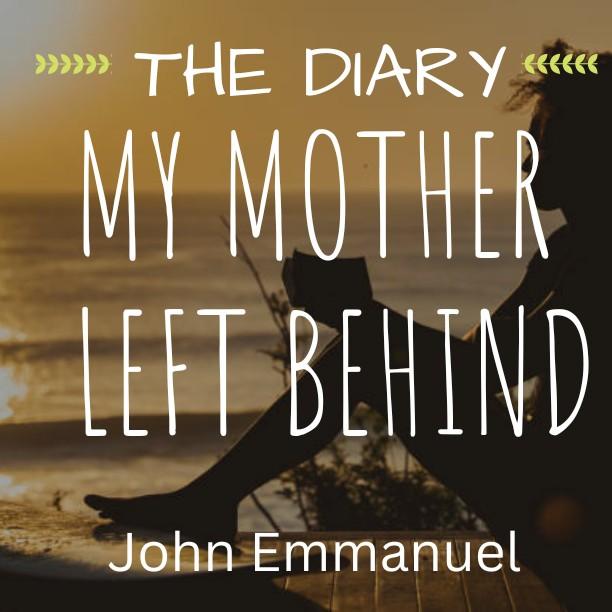
I came back for a burial. I didn’t expect to bury the version of my mother I’d held onto for ten years.
The sun in Umueze was different. It didn’t warm you — it seared through skin and memory. I stepped out of the rusted Toyota, dust clinging to my jeans, and looked at the house I hadn’t seen since I was nineteen.
They said my mother, Adaora, died in silence.
Funny. Silence was the only language she ever spoke fluently with me.
I hadn’t planned to cry. I thought I had buried those tears long ago — the day I packed my bags, slammed the door, and vowed never to come back. But standing in front of that house, surrounded by faces I barely remembered and grief that didn’t know my name, something cracked open.
Not a sob. Not yet.
But a thud in my chest that told me: You’re not ready for what’s waiting inside.
The Bible was old. The truth inside it was older.
I found it by accident.
Burial done, guests fed, condolences fading into the night. I was snooping, if we’re being honest. Looking for something to remind me I wasn’t adopted. That Adaora had once loved me — even if her version of love came dressed in silence and sharp eyes.
The Bible was under her pillow. Heavy. Smelled of dust and hibiscus powder.
I almost missed the diary tucked inside it. But when I flipped the pages of Luke, a smaller, handwritten book fell out. Leather-bound. Worn edges. Pages filled with slanted cursive that danced like she was afraid someone might read it. Someone like me.
I sat on her bed — still made, still stiff — and opened it.
“March 9th, 1993. Today I found out I’m pregnant. And it’s not his.”
I kept reading.
My mother was not the woman I thought she was.
She was seventeen when she fell in love with Father Clement — the young priest posted to their parish after the war.
She wrote about how his hands shook during confession. How he called her “daughter” but lingered too long when offering communion. How she felt like Eve — tasting the fruit and knowing she’d never be allowed to forget.
She got pregnant three months before her arranged engagement.
When the truth surfaced, it didn’t unravel quietly. Her mother — my grandmother — went mad with shame. A priest? A priest?
They rushed a wedding. Forced silence. Buried the shame in a new surname and a stern-faced man who was never truly mine.
And she obeyed. Because that’s what women from war-torn homes do.
They survive. Even if it means dying slowly inside.
“You remind me too much of myself.”
That’s what she told me the night I left.
I had just turned nineteen. I got a scholarship to study in California. She wanted me to decline it and stay close — marry Chibuzo, who ran a decent shop in Enugu and smiled too much for someone his age.
We fought.
I told her I wasn’t like her.
She slapped me so hard, my face rang for hours. And then she whispered, “Exactly.”
That night I packed everything I could into two suitcases and told her I’d make a life without her.
I did. Or so I thought.
“Forgive me. I couldn’t be soft with you. No one ever was with me.”
Page 54. Her handwriting trembled.
She wrote about how her own mother beat the softness out of her — told her crying was a waste of salt and silence was strength. How she prayed I’d be different. But when I started asking questions — about the war, about the man I called father, about her own scars — she panicked.
She didn’t know how to be loved without control.
She didn’t know how to mother someone who wasn’t afraid of her.
So she did what she was taught: she hardened.
The part that broke me wasn’t the truth. It was the tenderness.
She wanted to tell me.
She tried.
But every time I called from school, her words jammed behind the bitterness she wore like a scarf. Every message she drafted and deleted. Every birthday she missed, thinking I didn’t want to hear from her.
She wrote, “I watched my own daughter become a stranger. Not because I hated her, but because I didn’t know how to be anyone else but a survivor.”
I cried into that diary.
Ugly, shaking sobs. The kind you bury so deep, you don’t recognize your own voice when it finally erupts.
Grief is strange. It teaches you to hold hands with ghosts.
I stayed in the village two weeks longer than planned.
Every morning, I walked to the back of the compound and sat near the mango tree she once planted. I read her words. I read her. I let her explain — not because it fixed everything, but because it revealed everything.
She wasn’t a villain. She was a wound wearing a wrapper.
One afternoon, I found her old sewing machine. Still oiled. Still threaded. I ran my fingers over the pedal and imagined her stitching clothes for me with hands that never learned how to hug.
My grandmother was still alive.
I didn’t want to see her. But the diary led me to her door.
Her back was bent, her eyes dim, but her mind? Sharp as ever.
She said, “So you read it.”
I nodded.
She stared at me, long and quiet.
Then said, “Don’t let my daughter die with a lie in her mouth.”
She handed me a rosary. “He loved her, you know. The priest. He tried to leave the Church for her.”
I swallowed hard.
I didn’t know what to do with that kind of love. The kind that ruined two lives and still lingered decades later like smoke.
Healing didn’t look like forgiveness. It looked like understanding.
I didn’t stay forever.
But I didn’t rush back either.
I started writing in a new journal — one with blank pages and no shame. I wrote letters to my mother. To the version of her I never met. To the version of myself I was becoming.
The diary didn’t give me closure. It gave me a mirror.
And for the first time in my life, I looked at my reflection and didn’t see a rebellion.
I saw a continuation.
Because sometimes, the greatest inheritance isn’t land or money — it’s understanding the woman who came before you.
Your mother may not have known how to love you the way you needed — but she loved you the best way she knew how. Let that be the beginning of your healing.
I tell the kind of love stories that stay with you — the messy, unfiltered kind that unravel slowly and cut deep. Inspired by real emotion, rich culture, and everything we never say out loud, my fiction lives at the intersection of vulnerability and power. If you’ve ever loved like your soul depended on it… welcome home.

